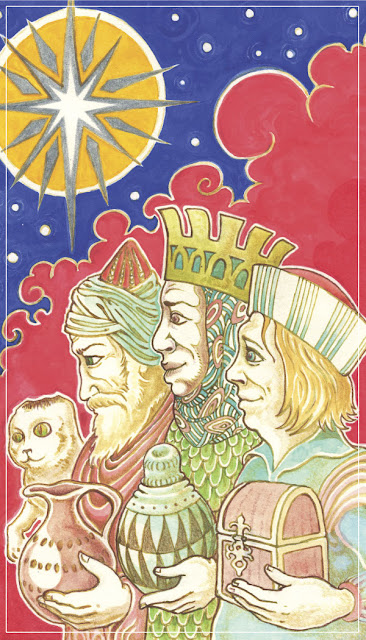Celebrating the Last Day of Christmas with an Excerpt from Christmas at the Mission (Sula): Epiphany
New political realities aside, January 6 has always been a special day. In the orthodox tradition, it is the first day of Christmas; in the Christian tradition, it is the last day of Christmas. In celebration, we offer an excerpt from Sula's book, Christmas at the Mission:
Epiphany
The Bible contains
only 12 mentions of the wise men (magi) and the Star of Bethlehem, but over
time they have captured nearly everyone’s attention. A Christmas pageant would
not be complete without the three magi, or as they are sometimes called, kings.
Many nativity scenes also include the three magi. Who were they? What did they
see? What did they know? Why are we enthralled with them?
Well, first, they saw a star. The star is called the
Star of Bethlehem because when the magi followed it, it stopped in Bethlehem
over the manger where Jesus lay.
The magi came from the east, following the star. They
seemed to know what the star meant because on the way, they stopped in
Jerusalem and asked directions: “Where is the one who has been born King of the
Jews? We saw His star in the east and have come to worship him.”
Oops! That made King Herod mad and scared. He called
the priests together and asked them where the Christ was supposed to be born,
and they told him that the prophet Isaiah has written that He would be born in
Bethlehem.
After that, King Herod called the magi secretly and
asked when they had seen the star. He also asked them to let him know when they
found Jesus so he could worship him, too, but he did not really intend to that.
Instead, knowing when the magi had seen the star, how far they had come, and
how long it should take helped him calculate the age of Jesus at that time.
That was not good, either, because then King Herod
could try to find and kill Jesus, which he did try. In fact, he ordered that
all babies under the age of two in Bethlehem be killed (see Advent: Feast of
the Holy Innocents). Jesus was not among them, though, because his parents had
been warned in a dream, and they left Israel before Jesus could be found.
Well, back to the magi. After talking to King Herod,
they continued on to Bethlehem, still following the star, which moved ahead of
them, showing them the way. Finally, it stopped, and they were able to give
their gifts of gold, frankincense, and myrrh to the baby and to worship Him.
When they finished worshipping, they remembered King
Herod’s words about letting him know the location of Jesus. However, a dream
warned them of King Herod’s planned treachery, and they went home another way.
Here are some fun facts about the magi.
· Why
do we always say three wise men? The Bible
[VW2] does
not tell us how many there were. We probably think there were three of them
because three gifts were given to Jesus.
· Scholars
are not sure where the wise men lived, but they think they came from Iraq,
Iran, Saudi Arabia, or Yemen; those places had different names back then:
Persia (Iran), Arabia (Iraq and Saudi Arabia), and Sheba (Yemen.) You probably
recognize the name, Sheba, because of its famous queen.
· Though
they have been called kings, there is
no evidence that they were kings.
Actually, the title magupati (magi) was a title given to priests in
the Zoroastrian religion, and they studied the stars like modern astronomers
and astrologers; therefore, a star like the Star of Bethlehem which appeared
right at the beginning of dawn, which would have been in the East, would have
been very significant to them (and it was).
· Given their assumed positions in life—and judging by the gifts they brought, they were probably rich.
This celebration of what the wise men knew and did is
called Epiphany. Epiphany means a few things, but all the meanings are
connected. It means manifestation (as in a sudden appearance) or it can mean a
sudden understanding, realization, or insight. The Epiphany as celebrated in
our Catholic customs is God’s manifestation of the birth of Jesus to the
Gentiles. (Those wise men were not Jewish!)
We have a tradition at our Mission that may have come
from Poland or Germany associated with the three kings. We know their names are
Caspar, Melchior, and Balthasar. We write C + M + B and the year in roman
numerals on a long, narrow piece of paper and put it over our doors to bless
our homes for the coming year. These three letters can also stand for “Christus mansionem benedicat" ("May Christ Bless This House”).
If you visit us at Old Mission San Juan Bautista perhaps you can pick up one of
these pieces of paper—or you can make your own.
See more excerpts from Christmas at the Mission HERE.
See more posts about Sula HERE.
See more images of Sula HERE.
Buy Sula's book HERE.





Comments
Post a Comment